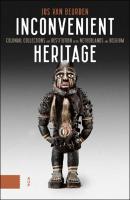Inconvenient Heritage
Colonial Collections and Restitution in the Netherlands and Belgium
Abstract
The discussion about objects, human remains and archives from former colonial territories is becoming increasingly heated. Over the centuries, a multitude of items – including a cannon of the King of Kandy, power-objects from DR Congo, Benin bronzes, Javanese temple statues, M.ori heads and strategic documents – has ended up in museums and private collections in Belgium and the Netherlands by improper means. Since gaining independence, former colonies have been calling for the return of their lost heritage. As continued possession of these objects only grows more uncomfortable, governments and museums must decide what to do.
How did these objects get here? Are they all looted, and how can we find out? How does restitution work in practice? Are there any appealing examples? How do other former colonial powers deal with restitution? Do former colonies trust their intentions? The answers to these questions are far from unambiguous, but indispensable for a balanced discussion.


 Download
Download